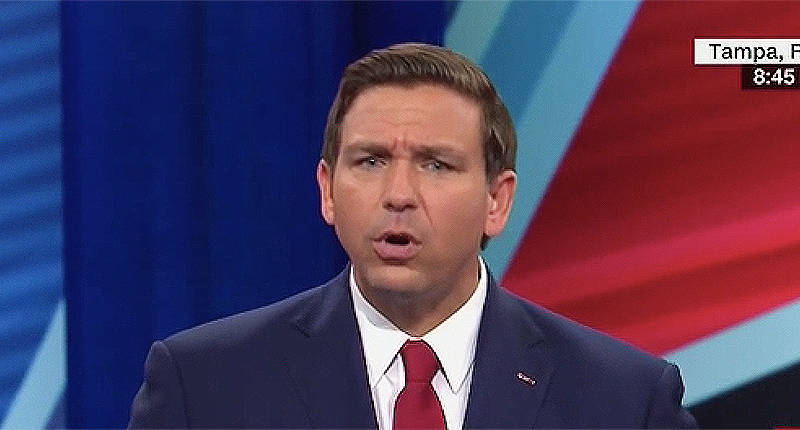On Tuesday, writing for Slate, legal reporter Mark Joseph Stern walked through the legal mess the Florida GOP created when they tried to roll back the voter-approved abolition of felony disenfranchisement with a law requiring rehabilitated convicts pay back all fines and fees before voting — and how it led to a rebuke from a federal judge.
"The first thing you need to understand about Florida’s poll tax — which U.S. District Judge Robert Hinkle sharply limited on Sunday — is that the state has no idea how to implement it," wrote Stern. "Setting aside the racial and democratic implications, the law sounds straightforward: It obligates former felons to pay all fines and fees associated with their sentence before they can cast a ballot. The scheme might function properly if Florida could identify residents with unpaid court charges and calculate how much they owe. But the state cannot do any of that, because it does not know who owes courts money or how much they owe. And even if ex-felons try to unearth their court-imposed fines and fees, they will probably fail. In most cases, reliable records do not exist."
"This chaos gives people with felony convictions two choices," wrote Stern. "They can register to vote and hope that state prosecutors do not later dig up court debts and bring criminal charges against them. Or, to avoid risking jail time, they can surrender their constitutional right to vote. On Sunday, in a 125-page decision, Hinkle ruled this predicament unconstitutional. In doing so, he meticulously detailed the extraordinary negligence and incompetence exhibited by Florida lawmakers as they rushed to stop ex-felons from voting."
"Remember that Florida is a pioneer in cash register justice: It literally funds its criminal justice system through a mind-boggling array of fines and fees imposed on everyone unfortunate enough to get arrested in the state," wrote Stern. "The nickel-and-diming spirals as you move through the system. You must pay to get a public defender. You must pay for medical care behind bars. You must pay to reinstate a suspended driver’s license. You must pay for drug abuse treatment, for electronic monitoring, for your own urinalysis. There is no exception for indigent defendants. And none of it is cheap: As Hinkle noted, one Florida county charges a minimum of $668 for a public defender and $548 if you forgo public defense. Even if you represent yourself, you must pay for the pleasure of appearing in court. And those costs go up when defendants are charged with multiple counts."
"Curiously, although Florida devised this scheme, it never created a uniform method of tracking payments," wrote Stern. "The Legislature left that job to the counties, whose own records are often out of date or incomplete. Some counties hire private debt collectors who add a 40 percent surcharge on unpaid court debt. Most debts still go unpaid. In 2018, the Florida Court Clerks and Comptrollers, an association that attempts to track court assessments, labeled 83 percent of court fines levied between 2014 and 2018 as having “minimal collections expectations.” That means they’ll probably never be paid. The same association reported that counties collect just 20.55 percent of fines and fees levied in circuit criminal courts, where most felony cases take place."
"A state budget analysis found that the division would require at least 21 extra employees" to check whether each voter is eligible, wrote Stern, but "the Legislature provided it with zero. As a result, there is currently a backlog of about 85,000 pending voter registrations from newly eligible Floridians ... [officials have] found no reliable method of determining how much they owe. Virtually every attempt to calculate this figure—by both state officials and expert accountants hired by the defendants—produces inconsistencies and discrepancies. The information does not exist."
Hinkle's order, Stern wrote, requires Florida officials to give any voter who requests it an "advisory opinion" on their eligibility within 21 days, or they are automatically re-enfranchised. A higher court could strike it down if Trump-appointed judges hear the case, but Stern suggests this is unlikely.
"In the process of defending SB 7066, Florida humiliated itself, revealing the extreme incompetence of myriad legislators, election administrators, and county officials," Stern wrote. "It is now painfully clear that would-be voters have no dependable way to figure out what they owe. The state plainly hoped this system would dissuade people from even attempting to vote for fear of criminal prosecution. In passing a poll tax, it also transformed its registration procedures into a Kafkaesque bureaucratic nightmare for 1.4 million Floridians. To reverse Hinkle’s order, a court would have to rationalize that nightmare, to claim that the state has not, in fact, infringed on residents’ constitutional right to vote. That cannot be done in good faith."
"Conservative judges may be eager to rubber-stamp run-of-the-mill voter suppression, but they sometimes shy away from especially egregious disenfranchisement," concluded Stern. "It is hard to see why courts would stick their necks out to defend Florida’s clown show."
Leave a Comment
Related Post
